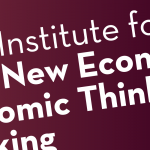New research by Nobel Laureate and Institute for New Economic Thinking Advisory Board member James Heckman finds strong economic gains from birth-to-five education programs
A groundbreaking study published has found that high-quality birth-to-five programs for disadvantaged children can deliver a 13% per child, per year return on investment through better outcomes in education, health, social behaviors and employment — which reduce long-term taxpayer costs and equip country’s workforce for a competitive future. Nobel economics laureate and Institute for New Economic Thinking Advisory Board member Professor James Heckman and colleagues from the University of Chicago and the University of Southern California’s Schaeffer Center have released their findings in a Human Capital and Economic Opportunity working group paper titled The Lifecycle Benefits of an Influential Early Childhood Program.
Heckman, Jorge Luis García, Duncan Ermini Leaf and María José analyzed the effects of two identical, random-controlled preschool studies conducted in North Carolina in the early 1970’s: The Carolina Abecedarian Project (ABC) and the Carolina Approach to Responsive Education (CARE). Heckman had previously established a 7-10% return on investment based on the analysis of the Perry Preschool program, which served 3- and 4-year-olds. ABC/CARE was a comprehensive model from birth to age 5 which combined health, nutrition, family engagement, child care and early learning and in turn provided long-term benefits that far outweigh the costs.
By calculating the value of child care in helping mothers enter the workforce and of ABC/CARE’s health benefits, the researchers confirmed a higher rate of return over the long term. The beneficial adult health outcomes, particularly the reduction in metabolic syndrome among males, were quantified by Heckman’s colleagues at the USC Schaeffer Center. The researchers also found that ABC/CARE was one of the few programs that permanently boosted IQ. According to Heckman, “that lasting effect in cognition, combined with increased social and emotional skills that are known to drive achievement, were factors in better outcomes and returns on investment.”
Heckman and his colleagues believe their findings underscore the need for increased access to comprehensive, high-quality child care and preschool options for disadvantaged children and families. “High-quality early childhood programs can boost the upward mobility of two generations by freeing working parents to build their careers and increase wages over time while their child develops a broad range of foundational skills that lead to lifelong success,” noted Heckman. “The data speaks for itself. Investing in the continuum of learning from birth to age 5 not only impacts each child, but it also strengthens our country’s workforce today and prepares future generations to be competitive in the global economy tomorrow.”







